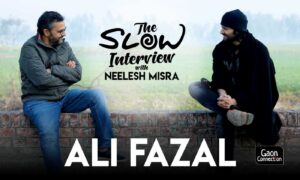What does a creator do when a decade-and-a-half after writing an iconic song, people still come up to him and ask him for the story behind it? That’s what often happens with lyricist-singer-writer-actor Swanand Kirkire. He might have a huge body of work to his credit, but few can look beyond ‘Baawra Maan’ from Sudhir Mishra’s Hazaaron Khwaishein Aisi.
“There was a time when I grew bored of it, but I realised that there would be one person who has not yet heard the story, and I repeat it dutifully for that one person,” he told Neelesh Misra at The Slow Cafe.
This episode is special because it features the conversation between two people known for their ability to infuse a certain lived-in experience with a touch of lightness to their lyrics. If ‘Baawra’ is Kirkire’s calling card, ‘Jadoo Hai Nasha Hai’ from Jism is Misra’s. They know what it is to have multiple interests, and the struggle to emerge out of a debut hit song.
“So many times, people have come up to me and said that I have not written anything better than ‘Baawra’. All I can tell them is that I write the other songs with as much honesty. Also, songs get written through us, we are but the medium,” Kirkire told Misra. But Kirkire said he knows where the question comes from. “I’ve done it myself. I once asked director Kundan Shah why he never made another Jaane Bhi Do Yaaron. He said ‘maaf karo’ [forgive me],” Kirkire laughed. “It comes from a place of freedom and intimacy, because your work touched them. This is the beauty of life,” he added.
Tracing his initial years, Kirkire recalled how his parents Chintamani and Neelambari focussed on their careers in the bank and university, respectively, as they furthered their musical training under Kumar Gandharv. “I was surrounded by music the whole day. I ran away from it for a bit, because of this. I sought refuge in theatre and then realised that music is an inextricable part of me,” he smiled.
That was when people started telling Kirkire that his voice was good too. His voice started featuring in plays, he had impromptu mehfils at home with fellow strugglers, and then he got introduced to Sudhir Mishra — ‘Baawra’ happened.
Many tend to think lyricists are like poets, allowing their free-flowing thoughts to fall into a meter. They don’t know we write for a tune, Misra and Kirkire said — in a song, the lyric writer falls at the bottom end of the hierarchy.
Have you ever felt that you were writing for the market and not for yourself? Are you mindful about that? Have you protected yourself and your craft, Misra asked. “We all go through that phase where we’ve escaped from the market. There’s this place in-between where you write for the story, without constraints. I got a chance to do that too. In fact, I had protected myself so much that when I had to write for the market, I could not,” said Kirkire.
That was when Kirkire explored acting and writing for films. There was a time when he actively and politely turned down offers to write songs. After writing all the songs in Gauri Shinde’s English Vinglish, he told her that he’d back off her Dear Zindagi, which Kausar Munir eventually wrote. “I told her I’d do anything else, but write the lyrics. I was consciously removing myself from that space,” said Kirkire, who also wrote songs for Aamir Khan’s Satyamev Jayate series, including the heart-tugging ‘O Ri Chiraiya’.
The conversation then veered towards the issue of lyricists getting their due in album credits. Check out the video here:
For someone who was doing well as a lyricist to move out was not very easy, but Kirkire knew he had to seek refuge in something else. His joy lay elsewhere — more precisely on the stage. “Theatre is not a bazaar, it’s pure. There is a lot of sanctity to it. You do it with a free mind. There are people who spend a couple of lakhs to go on a holiday. My holiday is working on a play. Theatre takes you in her lap, and envelopes you with love,” said Kirkire, who went on to act in the Marathi film Chumbak, to much acclaim.
At any stage of their careers, creators have to learn to figure when they are being used, and how to hold on to their core. “Cinema uses music, writing… it borrows from the other arts and uses them. If I do cinema, I’d rather do it in its purest form. The visual medium has taken over our lives, everything is designed. And, in the midst of this synchronised visual attack, you need to seek purity. I love cinema, but I have a problem, that it has become an istamal ka saadhan [tool to be used],” he said. Speaking about how as an industry, it does allow miracles such as Nawazuddin Siddiqui to shine, Kirkire said that one just has to sometimes wait for one’s turn.
It’s always lovely to revisit songs and the momentary spark that led to the birth of one. Speaking about ‘O Ri Chiraiya’, Kirkire said that when he was asked to write the song for the episode about female foeticide, he could only imagine how in some homes, daughters are called ‘chidiya’, the sparrow who flits away. “It was a novel show, non-filmi, issue-based and on television,” he recalled.
Is anger ever a trigger for Kirkire? Does he ever get angry? “Probably, the small things. But, I think I am a content person. I try to be content.”
Towards the end of the show, viewer requests came in for songs, and some questions were answered too.
We’ll leave you with this lovely line by Kirkire. “Some songs change our life. Some of our songs change others’ lives.”
Watch Also:



















